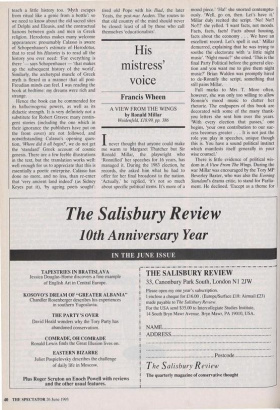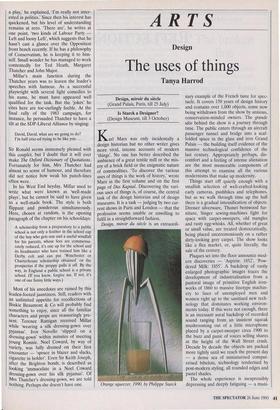His mistress' voice
Francis Wheen
A VIEW FROM THE WINGS by Ronald Millar Weidenfeld, £18.99, pp. 386 Inever thought that anyone could make me warm to Margaret Thatcher but Sir Ronald Millar, the playwright who `Ronnified' her speeches for 16 years, has managed it. During the 1983 election, he records, she asked him what he had to offer for her final broadcast to the nation. `Actually,' he replied, 'it's not so much about specific political items. It's more of a
mood piece.' Ha!' she snorted contemptu- ously. 'Well, go on, then. Let's have it.' Millar duly recited the script. 'No! No!! No!!!' she yelled. 'I want facts, not moods. Facts, facts, facts! Facts about housing, facts about the economy . . . We have an excellent record. Let's spell it out.' Millar demurred, explaining that he was trying to soothe the electorate with 'a little night music'. 'Night music?' she cried. 'This is the final Party Political before the general elec- tion and you want me to give them night music?' Brian Walden was promptly hired to de-Ronnify the script, something that still pains Millar.
Full marks to Mrs T. More often, however, she was only too willing to allow Ronnie's mood music to clutter her rhetoric. The endpapers of this book are decorated with some of the many thank- you letters she sent him over the years. `With every election that passes,' one begins, 'your own contribution to our suc- cess becomes greater . . . It is not just the role you play in speeches, unique though this is. You have a sound political instinct which manifests itself generally in your wise counsel.'
There is little evidence of political wis- dom in A View From The Wings. During the war Millar was encouraged by the Tory MP Beverley Baxter, who was also the Evening Standard's drama critic, to stand for Parlia- ment. He declined. 'Except as a theme for a play,' he explained, 'I'm really not inter- ested in politics.' Since then his interest has quickened, but his level of understanding remains at zero. 'There are', he writes at one point, 'two kinds of Labour Party Left and loony Left', which suggests that he hasn't cast a glance over the Opposition front bench recently. If he has a philosophy of Conservatism, he is keeping it to him- self. Small wonder he has managed to work contentedly for Ted Heath, Margaret Thatcher and John Major.
Millar's main function during the Thatcher years was to leaven the leader's speeches with humour. As a successful playwright with several light comedies to his name, he must have appeared well qualified for the task. But the 'jokes' he cites here are toe-curlingly feeble. At the final rally of the 1983 campaign, for instance, he persuaded Thatcher to have a tilt at the SDP-Liberal Alliance by singing:
David, David, what are we going to do? I'm half craz-ed trying to be like you .
Sir Ronald seems immensely pleased with this couplet, but I doubt that it will ever make The Oxford Dictionary of Quotations. Fortunately for him, Mrs Thatcher had almost no sense of humour, and therefore did not notice how weak his punch-lines often were.
In his West End heyday, Millar used to write what were known as 'well-made plays', but he cannot be said to have given us a well-made book. The style is both flippant and ponderous simultaneously. Here, chosen at random, is the opening paragraph of the chapter on his schooldays:
A scholarship from a preparatory to a public school is not only a feather in the school cap of the boy who gets one and a useful windfall for his parents, whose fees are commensu- rately reduced, it's one up for the school and its headmaster who have trained him like a Derby colt and can put 'Winchester or Charterhouse scholarship obtained' on the prospectus if the preppy pulls it off. By the way, in England a public school is a private school. (If you know, forgive me. If not, it's one of our funny little ways.)
Most of his anecdotes are ruined by this leaden-footed jauntiness. Still, readers with an unlimited appetite for recollections of Binkie Beaumont & Co will probably find something to enjoy, since all the familiar characters and props are reassuringly pre- sent. Terence Rattigan received Millar while 'wearing a silk dressing-gown over Pyjamas'. Ivor Novello 'slipped on a dressing-gown' within minutes of meeting Young Ronnie. Noel Coward, by way of variety, was fully dressed on their first encounter — 'spruce in blazer and slacks, cigarette in holder'. Even Sir Keith Joseph, after the Brighton bomb, is described as looking 'immaculate in a Noel Coward dressing-gown over his silk pyjamas'. Of Mrs Thatcher's dressing-gown, we are told nothing. Perhaps she doesn't have one.



























































 Previous page
Previous page